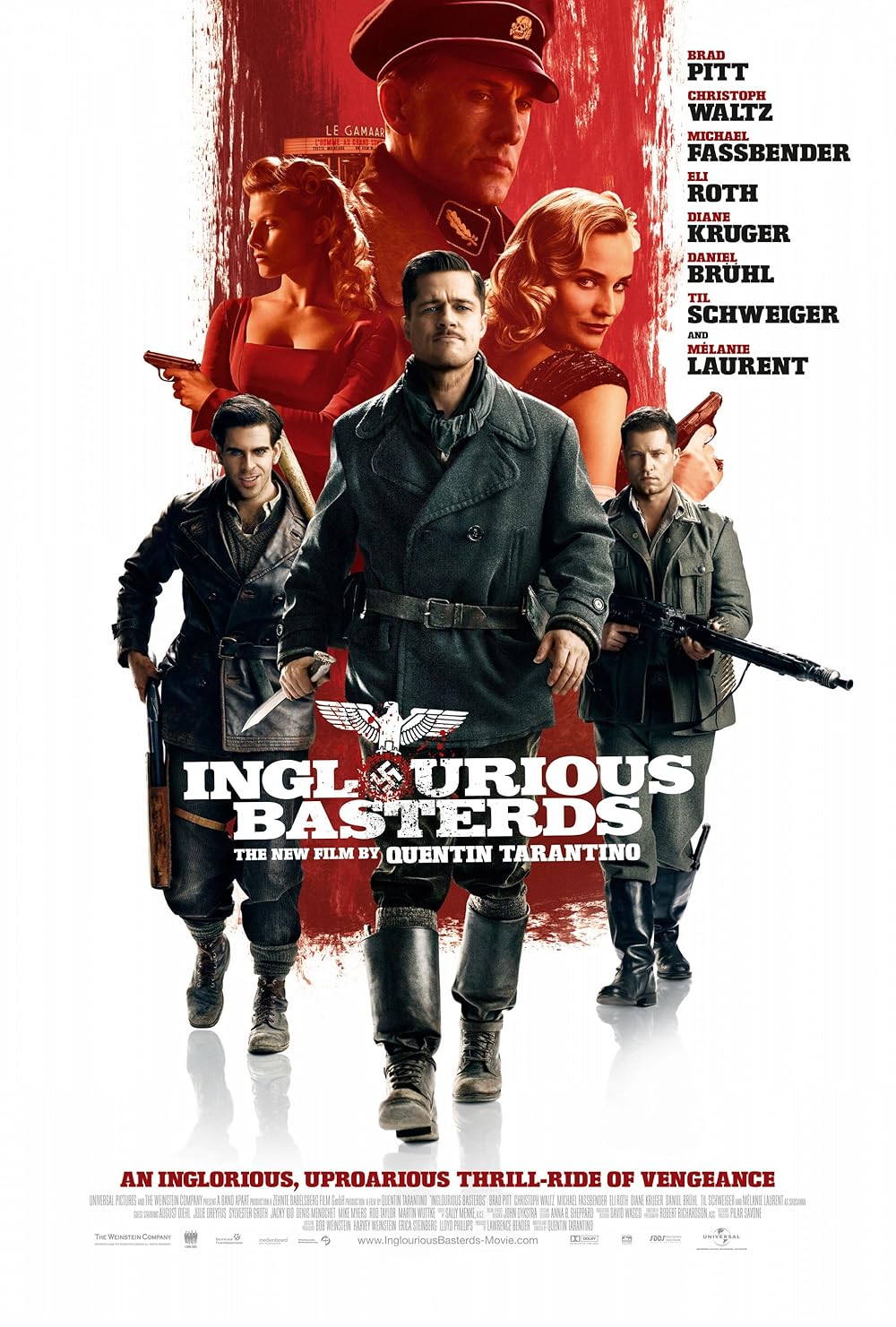


Inglourious Basterds premiered on August 21, 2009, delivering Quentin Tarantino's audacious reimagining of World War II through the lens of revenge fantasy and alternate history. This 2-hour and 33-minute war/drama category masterpiece combines Tarantino's signature dialogue-heavy scenes with explosive violence, creating one of cinema's most discussed and divisive war films.
With an exceptional 8.4/10 IMDb rating from over 1.5 million votes, watch Inglourious Basterds to experience the film that proved historical fiction could be rewritten through genre filmmaking while sparking debates about the ethics of revenge narratives set during humanity's darkest conflicts.
The Inglourious Basterds cast delivers uniformly excellent performances that anchor Tarantino's revisionist history in authentic character work. Brad Pitt Inglourious Basterds performance as Lt. Aldo Raine, the Tennessee-born leader of the Jewish-American guerrilla unit, provides darkly comic energy with his exaggerated Southern accent and brutal tactics against Nazis.
Furthermore, cast of Inglourious Basterds includes Christoph Waltz's career-defining, Oscar-winning portrayal of SS Colonel Hans Landa, "The Jew Hunter." Waltz creates cinema's most charismatic and terrifying villain, a polyglot detective whose intelligence makes him even more dangerous. Mélanie Laurent delivers powerful work as Shosanna Dreyfus, the Jewish cinema owner plotting revenge, while Diane Kruger portrays German film star and Allied spy Bridget von Hammersmark with sophisticated glamour masking deadly purpose.
Christoph Waltz Inglourious Basterds performance earned the actor his first Academy Award, launching him to international stardom. His portrayal of Hans Landa—switching effortlessly between French, German, English, and Italian—demonstrates linguistic mastery that enhances the character's predatory intelligence throughout the 153-minute runtime.
Additionally, Waltz's ability to make Landa simultaneously charming and monstrous creates unforgettable villain. The opening scene's 20-minute interrogation of a French farmer hiding Jews showcases Waltz's talent for building unbearable tension through seemingly polite conversation.
Who directed Inglourious Basterds? Quentin Tarantino crafted his most ambitious film, abandoning historical accuracy for wish-fulfillment fantasy where Jewish soldiers brutally exact revenge on Nazis. The director's bold choice to rewrite World War II's ending—killing Hitler in a movie theater—sparked debates about the ethics of historical revisionism.
Furthermore, Tarantino Inglourious Basterds approach combines his love of European cinema, spaghetti westerns, and exploitation films with serious engagement with Holocaust trauma. This fusion creates unique viewing experience that honors genre conventions while using them to explore historical revenge fantasies.
Was Inglourious Basterds purposely inaccurate? Absolutely. Tarantino deliberately rewrites history, creating a revenge fantasy where Jewish soldiers and a Holocaust survivor kill Hitler and top Nazi leadership. This controversial approach questions whether such alternate history trivializes actual Holocaust suffering or provides cathartic wish fulfillment for victims denied real-world justice.
Movie Details:
What is Inglourious Basterds about extends beyond simple war movie. The film examines revenge's moral complexity, questioning whether extreme violence against evil becomes justified when perpetrated by victims seeking justice. The parallel storylines—the Basterds' guerrilla campaign and Shosanna's personal vendetta—both culminate in the same Paris cinema where Nazi leadership gathers.
Furthermore, the movie explores cinema's power as weapon. Shosanna's plan to burn down her theater with Nazis trapped inside, while projecting her image explaining their deaths, makes film itself the instrument of revenge. This meta-commentary on cinema's influence reflects Tarantino's career-long fascination with movies as cultural force.
The film divides into five chapters, each focusing on different characters and time periods. This structure allows Tarantino to develop multiple revenge plots that eventually intersect, building tension throughout the substantial 153-minute runtime.
Is Inglourious Basterds based on a true story? No, the narrative is entirely fictional. Is Inglourious Basterds a true story in depicting Nazi brutality? While the violence against French civilians and persecution of Jews reflects historical reality, the Basterds themselves and the alternate history ending are pure invention.
Furthermore, is Inglourious Basterds true to the spirit of Jewish resistance? The film takes inspiration from real Jewish partisan groups and resistance fighters, though it exaggerates their tactics and numbers for dramatic effect. The scalping and baseball bat beatings represent Tarantino's stylized violence rather than documented historical practices.
While the specific story is fictional, Tarantino drew inspiration from real Jewish resistance fighters, partisan groups, and the documented desire for revenge among Holocaust survivors. The film's fantasy fulfillment acknowledges that real-world justice for Nazi crimes proved inadequate for many victims.
Brad Pitt Inglourious Basterds performance as Lt. Aldo Raine creates one of the actor's most memorable characters. His thick Tennessee accent, casual brutality, and demand that each Basterd bring him 100 Nazi scalps establishes the unit's ruthless mission. Pitt's performance balances dark humor with genuine menace.
Moreover, Raine's character represents American approach to war—pragmatic, brutal, and unconcerned with European nuance. His final line—carving a swastika into Hans Landa's forehead—"I think this just might be my masterpiece" provides the film's darkly satisfying conclusion.
Inglourious Basterds Hans Landa represents cinema's most complex villain. His nickname "The Jew Hunter" stems from detective-like ability to find hidden Jews, using psychological manipulation rather than physical force. The character's intelligence makes him more terrifying than typical Nazi villains.
Furthermore, Landa's eventual betrayal of the Nazi cause for personal survival demonstrates his complete amorality. He serves evil efficiently but abandons it instantly when doing so benefits him, making him a pragmatic monster rather than ideological fanatic.
The film's opening 20-minute scene between Landa and French farmer Perrier LaPadite demonstrates Tarantino's dialogue mastery. The seemingly polite conversation builds unbearable tension as Landa psychologically breaks the farmer, forcing him to reveal the Jewish family hiding beneath his floorboards. This sequence establishes Landa's terrifying effectiveness.
Where to watch Inglourious Basterds varies across streaming platforms, with availability changing based on licensing agreements. Premium IPTV services provide high-definition viewing that showcases Robert Richardson's beautiful cinematography and the film's detailed period production design throughout the 153-minute runtime.
Where can I watch Inglourious Basterds with optimal quality? Modern 4K restorations reveal the intricate costume work and the gorgeous European locations. The enhanced viewing includes behind-the-scenes documentaries exploring Tarantino's research process and the multilingual dialogue challenges.
Available Viewing Formats:
How long is Inglourious Basterds at 2 hours and 33 minutes allows Tarantino to fully develop the parallel revenge plots and extended dialogue scenes. The runtime enables the director to build tension through conversation before explosive violence releases accumulated pressure.
Furthermore, the film's chapter structure breaks the substantial runtime into distinct sections, each with its own tone and focus. This approach maintains engagement despite long stretches without traditional action sequences.
The Bear Jew Inglourious Basterds character, portrayed by Eli Roth, provides the film's most visceral violence. Donny's preferred method—beating Nazis to death with a baseball bat—represents Jewish revenge in its most primal form. Inglourious Basterds Bear Jew scenes deliver cathartic violence for audiences seeking Nazi comeuppance.
Moreover, the Bear Jew's introduction—emerging from a tunnel while pounding his bat—creates mythic quality around Jewish resistance. The character embodies the fantasy of victims becoming powerful enough to terrorize their oppressors.
The extended tavern scene where undercover Basterds meet with German actress/spy Bridget von Hammersmark demonstrates Tarantino's ability to build tension through cultural details. The Inglourious Basterds 3 fingers moment—where Michael Fassbender's British officer inadvertently reveals himself through incorrect German hand gesture—shows how small details can mean life or death.
Furthermore, Inglourious Basterds three fingers scene exemplifies how the film makes language and culture as dangerous as weapons. The sequence's violence erupts from cultural misunderstanding, demonstrating how war makes every interaction potentially lethal.
Why is Inglourious Basterds misspelled? Tarantino deliberately misspelled both words, claiming he wanted a unique title that couldn't be confused with other films. Why is Inglourious Basterds spelled wrong also serves aesthetic purposes—the unconventional spelling suggests the film's revisionist approach to history itself.
Additionally, the misspelling reflects the film's pulp influences and Tarantino's love of exploitation cinema, which often featured intentional misspellings and grammatical errors in titles for stylistic effect.
Mike Myers Inglourious Basterds cameo as British General Ed Fenech surprised audiences expecting comedy from the Austin Powers star. Is Mike Myers in Inglourious Basterds? Yes, though his brief appearance demonstrates dramatic range. Mike Myers in Inglourious Basterds plays the role completely straight, briefing Lt. Raine on "Operation Kino" without any comedic flourishes.
Shosanna's plan to burn down her cinema with Nazis trapped inside makes the movie theater itself the ultimate weapon. The meta-commentary on cinema's power—using film to kill those gathered to watch propaganda—reflects Tarantino's belief in movies' cultural significance.
Furthermore, the climactic sequence intercutting between the burning theater and the film-within-a-film creates layers of meaning about cinema's role in shaping history and memory. The revenge enacted through projection literally makes watching movies deadly.
Does Inglourious Basterds have subtitles? Yes, extensive subtitles are essential as characters speak French, German, and Italian in addition to English. The multilingual dialogue adds authenticity while creating suspense around language comprehension and cultural deception.
Moreover, Tarantino's decision to use authentic languages rather than having everyone speak English demonstrates commitment to realism within the fantastic narrative. The language barriers become plot points rather than obstacles to overcome through dubbing.
Where was Inglourious Basterds filmed primarily in Germany and France, with the production using actual European locations to create period authenticity. The cinema scenes were shot in a real 1930s theater, while the tavern sequence used an authentic German location that enhanced the claustrophobic tension.
The film sparked intense debate upon release. Critics praised the craftsmanship while questioning the ethics of creating revenge fantasies about the Holocaust. The discussion continues: does rewriting history to give victims violent revenge honor or trivialize their actual suffering?
Furthermore, the movie's success proved audiences would embrace complex, dialogue-heavy war films that subverted expectations. The Academy Award nominations including Best Picture validated Tarantino's ambitious revisionist approach.
Inglourious Basterds awards include Christoph Waltz's Oscar for Best Supporting Actor, along with seven additional nominations including Best Picture, Best Director, and Best Original Screenplay. The recognition demonstrated that Tarantino's controversial revisionism could achieve both commercial success and critical acclaim.
Why is Inglourious Basterds rated R stems from strong graphic violence, including scalpings, beatings, and the climactic theater burning. The rating also reflects pervasive strong language and brief sexuality, with Tarantino's signature approach to violence earning the restrictive rating.
Since release, Inglourious Basterds influenced subsequent alternate history narratives and revenge fantasies. The film demonstrated that historical revisionism could provide emotional catharsis while acknowledging it as fantasy rather than reality.
Moreover, the movie launched Christoph Waltz to international stardom and proved Brad Pitt's willingness to embrace character roles over conventional leading man parts. The film's success encouraged more ambitious, unconventional approaches to historical filmmaking.
Inglourious Basterds forms the first entry in Tarantino's loose "revenge trilogy," followed by Django Unchained and The Hateful Eight. Each film explores how victims of historical oppression might exact violent retribution against their oppressors.
Inglourious Basterds transcends its war/drama category to become essential cinema that demands engagement with both its artistry and ethics across the 153-minute runtime. The film's examination of revenge fantasies set during the Holocaust remains provocative and divisive, exactly as Tarantino intended.
Whether experiencing this masterpiece for the first time or revisiting its explosive alternate history, watch Inglourious Basterds streaming through premium IPTV services ensures optimal viewing quality that honors the beautiful cinematography and the performances—particularly Christoph Waltz's Oscar-winning work—that make this war film unforgettable.
The film's enduring power stems from its refusal to provide easy answers about depicting historical trauma through revenge fantasy. Through parallel plots converging in a burning cinema, audiences confront questions about justice, revenge, and whether rewriting history to give victims victory provides catharsis or trivializes actual suffering.
Watch Inglourious Basterds today and discover why it remains one of cinema's most discussed achievements—a film that dares to rewrite World War II's ending while forcing viewers to question whether such fantasies honor or exploit the victims they claim to avenge.
(for customer service and support)
(for new customers)